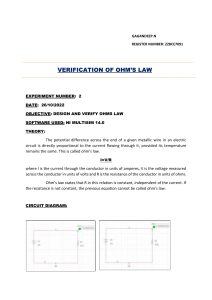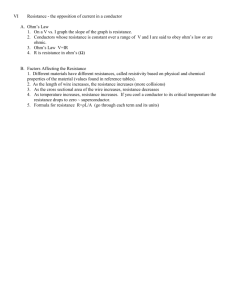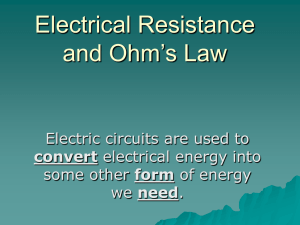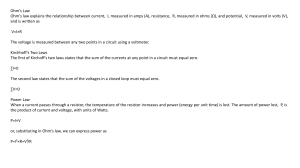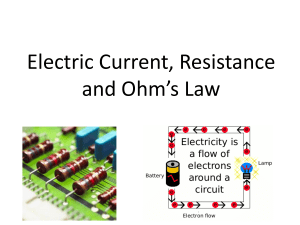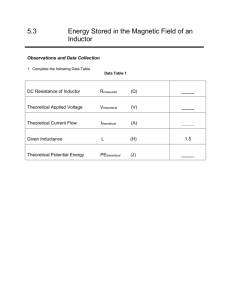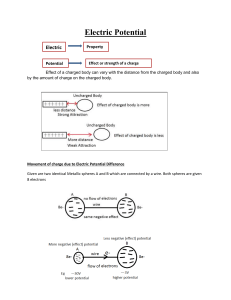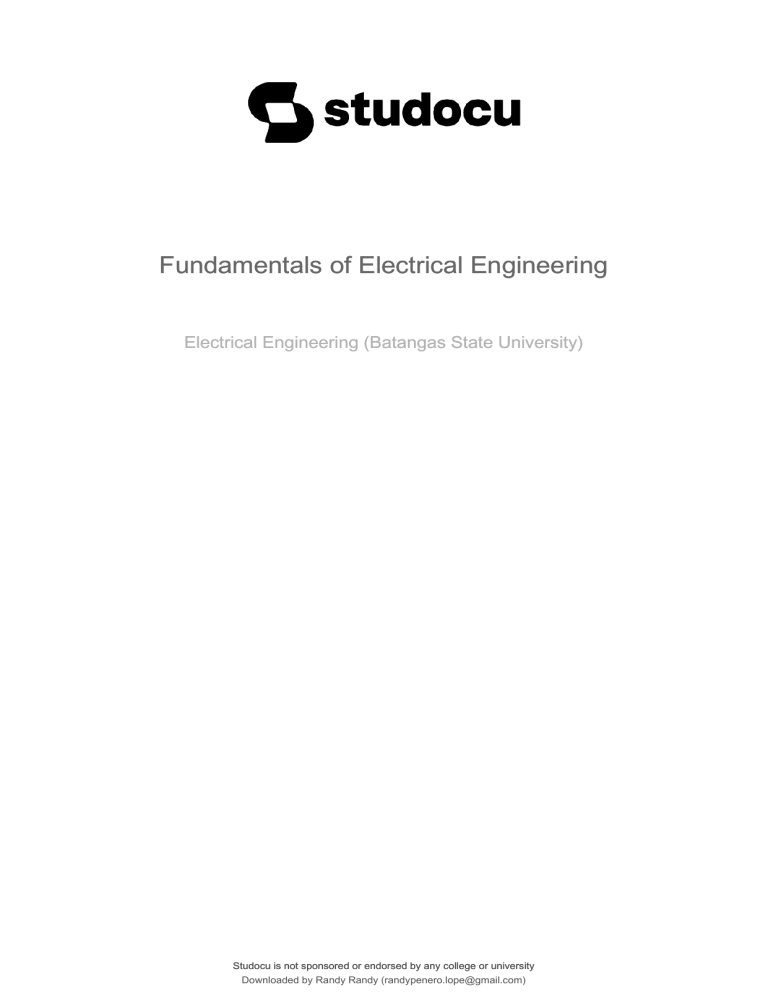
lOMoARcPSD|28480283 Fundamentals of Electrical Engineering Electrical Engineering (Batangas State University) Studocu is not sponsored or endorsed by any college or university Downloaded by Randy Randy (randypenero.lope@gmail.com) lOMoARcPSD|28480283 Fundamentals of Electrical Engineering 1. 2. 3. 4. 5. 6. 7. If P is the power of a star connected system then what will be power of an equivalent delta connected system? a. P b. 3P c. P/3 d. None of the above Magnetic flux has the unit of a. Newton b. Ampere-turn c. Weber d. Tesla The voltage induced in an inductor is represented as a. Product of its inductance and current through it b. Ratio of its inductance to the current through it c. Ratio of the current through it to its inductance d. Product of its inductance and rate of change of current through it Instantaneous power in inductor is proportional to the a. Product of the instantaneous current and rate of change of current b. Square of instantaneous current c. Square of the rate of change of current d. Temperature of the inductor The unit of resistivity is a. Ohm b. Ohm – meter c. Ohm per meter How many coulombs of charge flow through a circuit carrying a current of 10 A in 1 minute? a. 10 b. 60 c. 600 d. 1200 The resistance of a conductor of diameter d and length I is R ohms. If the diameter of the conductor is halved and its length is doubled, the resistance will be a. R Ohm 8. 9. 10. 11. 12. 13. 14. 15. b. 2R ohm c. 4R ohm d. 8R ohm The resistivity of the conductor depends on a. Area of the conductor b. Length of the conductor c. Type of material d. None of these If 1A current flows in a circuit, the number of electrons flowing through this circuit is a. 0.625x10^19 b. 1.6x10^19 c. 1.6x10^-19 d. 0.625x10^-19 Which of the following are the passive elements a. Resistor b. Bulb c. Both d. None of these Power dissipation in ideal inductor is a. Maximum b. Minimum c. Zero d. A finite value Inductor does not allow the sudden change of a. Current b. Voltage c. Power d. None of the above Capacitor does not allow the sudden change of a. Current b. Voltage c. Power d. None of the above Internal resistance of ideal voltage source is? a. Zero b. Infinite c. Finite d. 100 ohms Internal resistance of ideal current source is a. Zero b. Infinite c. Finite d. 100 ohms Downloaded by Randy Randy (randypenero.lope@gmail.com) lOMoARcPSD|28480283 16. Which quantity should be measured by the voltmeter? a. Current b. Voltage c. Power d. Speed 17. Which quantity consists of a unit 1KWH a. Energy b. Time c. Power d. Charge 18. Which of the following has no units? a. Permeability b. Moment of a magnet c. Magnetic susceptibility d. Permittivity 19. Which of the following quantities consists of SI unit as WATT a. Force b. Charge c. Current d. Power 20. Electric pressure is also called a. Resistance b. Power c. Voltage d. Energy 21. The substances which have a large number of free electrons and offer a low resistance are called ___? a. Insulators b. Inductors c. Semi-conductors d. Conductors 22. Out of the following which is not a poor conductor __________? a. Cast iron b. Copper c. Carbon d. Tungsten 23. Out of the following which is an insulating material? a. Copper b. Golf c. Silvre d. Paper 24. The property of a conductor due to which it passes current is called_______________? a. Resistance 25. 26. 27. 28. b. Reluctance c. Conductance d. Inductance Conductance is reciprocal of ___________? a. Resistance b. Inductance c. Reluctance d. Capacitance The resistance of a conductor varies inversely as _____________? a. Length b. Area of cross-section c. Temperature d. Resistivity With rise in temperature the resistance of pure metals___________? a. Increases b. Decreases c. First increases and then decreases d. Remains constant With rise in temperature the resistance of semiconductors______________ a. Decreases b. Increases c. First increases and then decreases d. Remains constant Downloaded by Randy Randy (randypenero.lope@gmail.com)
